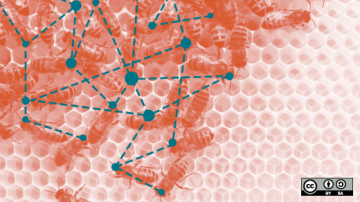After you've established a positive reputation in an open community—hopefully, as we discussed in our previous article, by being an active member in and contributing productively to that community—you'll have built up a healthy "bank balance" of credibility you can use to influence the direction of that community.
What does this mean in concrete terms? It means you can contribute to the decisions the community makes.
In this article, we'll explain how best to do this—and how best not to do it.
Understanding influence
To some, the term "influence" denotes a heavy-handed approach to imposing your will over others. That is one way to exercise influence. But "influencing" others over whom you have clear political or economic power and seeing them obey your commands isn't too difficult.
In an organization structured such that a single leader makes decisions and simply "passes down" those decisions to followers, influence isn't earned; it's simply enforced. Decisions in this sense are mandates. Those decisions don't encourage differing views. If someone questions a decision (or raises a contrarian view) he or she will have a difficult time promoting that view, because people's employment or membership in the organization depends on following the will of the leader. Unfortunately, many hierarchical organizations around the world run this way.
When it comes to influencing people who can actually exercise free will (and most people in an open organization can, to some degree), patience is both necessary and useful. Sometimes the only way to make quick progress is to go slowly and persistently.
Balancing empathy and confidence
Apart from patience and persistence, what else will you need to display in order to influence others in an open organization? We think these factors are important:
Expressing empathy
It's easy to become frustrated when you encounter a situation where you simply cannot get people to change their minds and see things your way. As human beings, we all have beliefs and opinions. And all too frequently, we base these on incorrect information or biases. A key element to success at influencing others in an open organization is understanding not only others' opinions but also the causes behind them.
In this context, empathy and listening skills are more important than your ability to command (and more effective, too). For example, if you propose a change in direction for a project, and other people object, think: Are they objecting because they are carrying emotional "baggage" from a previous project that encountered problems in a similar situation? They may not be able to see your point of view unless they can be freed from carrying around that baggage.
Having confidence (in yourself and others)
In this context, to be successful in influencing others, you must have reached your own conclusions through a rigorous vetting process. In other words, must have gotten past the point of conducting internal debates with yourself. You won't influence others to think or do something you yourself don't believe in.
Don't misunderstand us: This is not a matter of having blind faith in yourself. Indeed, some of the most dangerous people around do not know their own limits. For example, we all have a general understanding of dentistry, but we're not going to work on our own teeth (or anyone else's, for that matter)! The confidence you have in your opinion must be based on your ability to defend that position to both others and yourself, based on facts and evidence. You also have to have confidence in your audience. You have to have faith that when presented with facts and evidence, they have the ability to internalize that argument, understand, and eventually accept that information.
Moving forward
So far we've focused almost exclusively on the positive situations in which you'd want to apply your influence (i.e., to "bring people around" to your side of an issue). Unfortunately, you'll also encounter negative situations where team members are in disagreement, or one or more team members are simply saying "no" to all your attempts to find common ground.
What can you do if you hit this type of brick wall? How can you move forward?
The answer might be by applying patient, persistent, and empathetic escalation, along with some flexibility. For example:
- Search for the root causes of disagreement: Are the problems that you face technical in nature, or are they interpersonal? Technical issues can be difficult to resolve, but interpersonal problems can be much more difficult, as they involve human needs and emotions (we humans love to hold grudges). Does the person with whom you're dealing feel a loss of control over the project, or are they feeling marginalized? With distributed teams (which often require us to communicate through online tools), hard feelings can grow undetected until they explode into the open. How will you spot and resolve these? You may need to invest time and effort reaching out to team members privately, on a one-to-one basis. Based on time zones, this may require some late nights or early mornings. But it can be very effective, as some people will be reluctant to discuss disagreements in group meetings or online chats.
- Seek common ground: A blanket refusal to compromise on a topic can sometimes mask areas of potential agreement. Can you sub-divide the topic you're discussing into smaller pieces, then look for areas of possible agreement or common ground? Building upon smaller agreements can have a multiplier effect, which can lead to better cooperation and ultimately agreement on larger topics. Think of this approach as emulating a sailboat facing a headwind. The only way to make forward progress is to "tack"—that is, to move forward at an angle when a straight ahead path is not possible.
- Enlist allies: Open teams and communities can feel like families. At some point in everyone's family, feuds break out, and you can only resolve them through a third party. On your team or in your community, if you're locked in a polarizing disagreement with a team member, reach out to other members of the team to provide support for your conclusions.
And if all that fails, then try turning to these "last resorts":
- Last Resort #1: If empathetic approaches fail, then it's time to escalate. Start by staging an intervention, where the full team meets to convince a team member to adopt a team decision. It's not "do what I'm tellin' ya"; it's "do what we all are asking you to do and here's why."
- Last Resort #2: If all else fails—if you've tried everything else on this list and the team is mostly in agreement, yet you cannot get the last few holdouts to agree—then it's time to move on without them. Hopefully, this will be a rare occurrence.
Conclusions
In a traditional, top-down organization, a person's degree of influence springs from that person's position, title, and the economic power the position commands. In sharp contrast, many open organizations are meritocracies in which the amount of influence a person possesses is directly related to the value of the contributions that one makes to the community. In open source communities, for example, influence is earned over time through contributions—and through patience and persistence—much like a virtual currency. Making slow, patient, and persistent progress can sometimes be more effective than trying to make quick progress.
Remember, in an open organization, great ideas can come from anyone, not just someone in a leadership position, and those ideas must always be reviewed to ensure they provide value. Influence in an open community—like happiness in life—must always be earned. And, once earned, it must be applied with patience and sensitivity to other people's views (and the reasons behind them), and with confidence in both your own judgement and others' abilities to accept occasionally unpleasant, but still critical, facts.







Comments are closed.